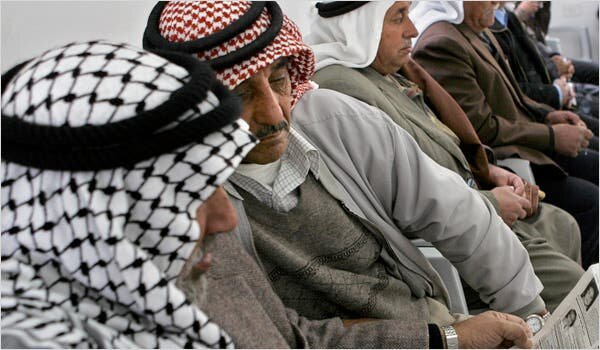Wearing a Keffiyeh: Fashion Statement or Point of Cultural Solidarity? Beirut and Beyond Contributor: Micala Khavari
Palestinian men wearing the Keffiyeh Kevin Frayer/Associated Press
A few months ago, Beirut and Beyond partnered with an organization called Keffiyeh Masks to support COVID-safe practices and to support Palestinians. The brand makes masks in the keffiyeh pattern to support Palestinians in Palestine and Palestine-focused non-profits in the U.S. If you're confused about how a pattern can support Palestinians, you’re probably not the only one. Especially because you’ve probably seen the pattern on scarves here in the U.S and not questioned if they had some sort of meaning. Perhaps, some of you are aware of the derogatory words against it, as a "terrorist scarf" (the Los Angeles Times once called it “terrorist chic”). Or maybe you’ve seen it used it in costumes—caricatures of Arab people for Halloween.
Keffiyehs are not a fashion statement, a costume, or representative of terrorism. Keffiyehs are symbolic of Palestinian resistance and Arab pride.
A Brief History of the Keffiyeh
The keffiyeh has long been worn by Arab farmers to keep the sun off their necks and dust out of their eyes. Secured by an Aquel rope, it works as a multipurpose accessory to shield from the wind and to wipe stuff off with, if you’re so inclined. Kaffiyehs became a symbol of resistance during the British Mandate when Palestinian rebels would hide their faces with their scarves to hide their identity. When the British tried to find them, other Palestinians started wearing them too in support and resistance. The popularity of the kaffiyeh didn't hit the mainstream though, until the 1960s when Palestinian Liberation Organization (PLO) leader Yasser Arafat
started wearing it in solidarity with his countryman. Often, over his left shoulder, in a triangle shape to represent the land Palestine had lost. In the 80s wearing keffiyehs became popular with the West, as supporting the Palestinian cause became more urgent with the First Intifada in 1987 and the Second in 2000.
The trouble with that popularity came in the 2000s, when celebrities and clothing designers popularized the design without reporting the origins and symbolism. Commoditization of Keffiyehs has led China to take over the market, and thus diluting the meaning with no remembrance of Palestine. Now, there's only one genuine keffiyeh maker in Palestine.
A Symbol of Solidarity and Resistance
So, is your local hipster in the wrong to wear a kaffiyeh? Or what about that kaffiyeh patterned dress? Is it bad to buy a kaffiyeh from Forever 21 if they're selling? Luckily, the answers you seek aren't complicated. For Palestinians, they're a symbol of resistance against the oppression, dehumanization, and erasure that they face. It also connects them to the wider Muslim and Arab cultures that wear kaffiyehs as well. For allies, it’s a physical reminder and statement to the world to stand in solidarity with Palestine. So, if your local hipster knows that, and is ready to explain its connection to Palestine, they’re probably in the clear.
However, buying a kaffiyeh that didn't originally come from Palestine isn't the best idea. Sure, you can explain the pattern and its meaning just fine now but supporting a company that designed it with no intention of remuneration back to Palestinians or remembrance, actually takes away from Palestinians. Instead, buy your kaffiyeh from the last kaffiyeh maker in Palestine! This not only adds to the local economy but supports a small business.
You might also be wondering if it's wrong to buy kaffiyeh patterned things that aren't in the traditional square shape, it's not! After all, Beirut and Beyond is partnered with Keffiyeh Masks, which does not make scarfs or head wraps. And traditionally, Palestinians and Arabs use them in a variety of ways as well. Hijabs, table runners, backgrounds, nursing covers, chair covers can all be made from kaffiyeh material.
If you are interested in learning more or wearing a kaffiyeh or kaffiyeh product here are a few links:
https://handmadepalestine.com/blogs/news/history-of-keffiyeh-the-traditional-palestinian-headdress
https://bennorton.com/white-people-wearing-the-keffiyeh-solidarity-vs-cultural-appropriation/
Micala Khavari has been Beirut and Beyond's intern since May 2020. She is an International Studies Major at the University of Denver with minors in Writing Practices and Religious Studies. She has a heart for the Middle East, immigration, and talking your ear off about both! She also makes the weekly Friday Facts posts for Beirut and Beyond and looks forward to being B&B's intern as long she can.


